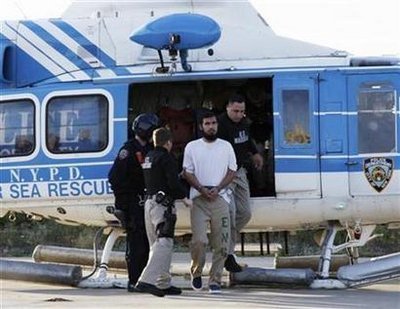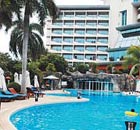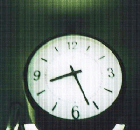Asia-Pacific
Afghan admits plot to bomb the NY subway
(Agencies)
Updated: 2010-02-23 14:31
 |
Large Medium Small |
|
|
NEW YORK: A former airport shuttle driver accused of buying beauty supplies to make bombs for an attack on New York City subways pleaded guilty Monday, admitting he agreed to conduct an al-Qaida-led "martyrdom operation" because of US involvement in his native Afghanistan.
Najibullah Zazi told a judge the terror network recruited him to be a suicide bomber in New York, where he went to high school and once worked a coffee cart just blocks from the World Trade Center site.
"I would sacrifice myself to bring attention to what the US military was doing to civilians in Afghanistan," Zazi said in court.
The officials spoke on condition of anonymity because the terror investigation is ongoing.
Zazi, 25, pleaded guilty to conspiring to use weapons of mass destruction, conspiring to commit murder in a foreign country and providing material support for a terrorist organization. He faces a life prison sentence without parole at a sentencing in June.
The bombings "could have been devastating," US Attorney General Eric Holder said in Washington. "This attempted attack on our homeland was real, it was in motion, and it would have been deadly."
Zazi said in court he traveled to Pakistan in 2008 to join the Taliban and fight against the US military but was recruited by the terrorist network in Peshawar and went into a training camp in Waziristan, a tribal region of Pakistan where al-Qaida is known to operate.
Zazi said he received weapons training at the camp and learned about explosives. He also said in court that he had been in contact with al-Qaida operatives while in Pakistan, but he did not identify them.
"During the training, al-Qaida leaders asked us to return to the United States and conduct martyrdom operation," he said. "We agreed to this plan."
The Pakistan Embassy in Washington declined to comment on Zazi's case.
Zazi admitted using notes taken at the training camp to build homemade explosives with beauty supplies purchased in the Denver suburbs and cooked up in a Colorado hotel room. He then drove the materials to New York just before the eighth anniversary of the September 11 terror attacks.
His plan was to assemble the bombs over the weekend and detonate them in the following days.
While entering the city, he was stopped by police for a routine traffic violation on the George Washington Bridge, which connects New Jersey and New York. Suspicious officers allowed him to go free but kept a close watch on his movements.
"The plan was to conduct martydom operation on the subway lines in Manhattan as soon as the material was ready," he said, adding the attack involved a number of bombs.
Days later, authorities raided several Queens apartments, including a friend's home where Zazi had stayed.
Asked by federal Judge Raymond J. Dearie if he had been willing to be a suicide bomber, Zazi said, "Yes, your honor."
Sometime after the traffic stop, Zazi realized New York authorities were investigating him. "At that point, we threw away the detonator explosives and other materials," he said.
One of the people familiar with the investigation said that Zazi told prosecutors that he made roughly two pounds (900 grams) of a powerful and highly unstable explosive called triacetone triperoxide, or TATP.
The same explosive was used by would-be shoe bomber Richard Reid in 2001 and the terrorists who carried out the London bombings in 2005 that killed 52 people. In those instances, TATP was not the main charge; it was the detonator.











